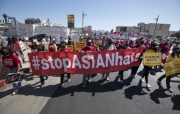Famous Italian broadcasters disparaged Asians by tearing their eyes apart during a broadcast. What can we do in a society where Asian hatred prevails? .................................Ed
Recently, international society has been in an uproar over the incidence of racial hate crimes in the U.S. A total of 122 hate crimes against Asians occurred in major U.S. cities in 2020, an increase of 149% year-to-year. Hatred against Asians has steadily become controversial, but the situation became more serious, as political causes and several other reasons, such as xenophobia caused by COVID-19, are concerned. It should be noted that simple hate rapidly developed into many forms of crimes. There are concerns about an increasingly organized aspect on a personal level. Indiscriminate crimes may present conflicts among racial groups.
As a result, the Anti-Asian Hate movement sprung all over the U.S. Its main slogan is ‘Stop Asian Hate.’ It censured Asian hate by putting ‘Anti’ before ‘Asian Hate Crimes’ and ‘Asian Racism.’ Various examples confirm this kind of trend ranging from rallies and protests in many regions to expressions in SNS.
1. The Slogan Becomes a Movement: American Citizens’ Participation

A decisive cause for the movement was the ‘Atlanta shooting.’ It was an apparent racial crime in which six of the eight victims were Asian women. To stamp out racism, citizens urged everyone to take direct action instead of being silent. As a consequence, on March 19, a protest was held in a Korean town in Los Angeles. Several Korean organizations and Korean residents drove through the Korean town by car. Demonstrators asserted that Asian hate crimes are never anyone’s business. They also expanded the scale and the form of the protest throughout the U.S. to deliver their message.
Now, the ‘Stop Asian Hate’ slogan has become a movement. Since mid-March, many citizens have participated in the Korean town, major roads, or small neighborhoods in the United States. Group marches and one-man demonstrations were mainly held offline. Online, the main platform was SNS. The hashtag movement began by posting a text and adding a # in front of it to promote a cause. The participation of famous Hollywood stars, including Sandra Oh and Natalie Portman, hoped that more voices would be heard.
2. Race Isn’t a Fault: “Can You Imagine Wanting to Apologize to Your Abuser?”

Asian Americans say that racism did not just suddenly happen. Korean-American actor Daniel Kim told CNN that his sister experienced discrimination. Kim explained that the situation involved a white man hitting his sister on the road only because she was Asian, and criticized the police officers who were in charge of his sister’s case at the time for not recognizing the incident as a hate crime (2015). He said that the perpetrator was only charged with violent driving.
Singer Eric Nam’s article in TIME, a famous weekly magazine in the United States, led a great wave in Korea. Born and raised in Atlanta, he suffered unfair racism and violence. He wrote about his feelings, constantly asking, “Am I wrong? Do I need to apologize?” He also urged the government to push for change, not to be silent when it comes to hate crimes against AAPI (Asian and Pacific) by saying, “An attack on one of us is an attack on all of us, but the good news is, change can also start with one of us.”
Following Eric Nam, BTS showed ‘grief and anger’ toward hate crimes. On Twitter, you can see lots of the #StopAsianHate hashtag, along with the experience of discrimination only because they happen to be Asian. Furthermore, global entertainers, such as Super Junior’s Choi Siwon and singer CL, began to speak up. Thus, the Anti-Hate Crime movement gained more attention in Korea.
3. The Reaction of the U.S. Government and Possible Political Solutions

In Washington, D.C., a hearing was held on the subject of discrimination and violence targeting Asian-Americans for the first time since 1987. “The former President Trump called COVID-19 a Chinese virus, which made harassment against Asians even worse,” Asian lawmakers said at the hearing. They also pointed out that media has stopped calling the motives of the case as sexual addiction, and it should be expressed exactly as a hate crime targeting Asians or women.
President Joe Biden also visited Atlanta, and stressed, “If you stay silent, you will become an accomplice. You have to act.” The U.S. government seems to have a clear will to resolve the incidence of hate crimes, as the House of Representatives has launched hearings on Asian hate crimes at an unusually quick pace. Politicians are condemning crimes against humanity. On April 22, a bill on hate crimes was passed in the Senate. The bill (COVID-19 Hate Crime Act), initiated by the Democratic Senator Meiji Hirono, Hawaii, was passed with overwhelming votes in the Senate on Tuesday, garnering 94 votes in favor of the bill, and one in opposition.
The passage of the bill has paved the way for political countermeasures against the increase in hate crimes against Asian Americans. However, Hirono said, “We will not change people’s minds through the passage of the bill.” He added, “The problem associated with cultural awareness and attitude remains.”
Movements gain the power of influence. On the other hand, there is a limit on practical aid. To address this defect, posting of official documents to enact protection laws and forming of support groups are being prepared. Above all, a fundamental solution requires a united front of all members beyond Asians. Some pointed out the low participation rate of other races, compared to BLM (Black Lives Matter). In other words, international publication and resolution of racism must require solidarity with white and black societies. Though the movement is short-term, it is important to have constant personal and social attention. Everyone’s participation will contribute to a safe global community without discrimination.
Park Jun-young (ST Reporter)
juninge@soongsil.ac.kr
Park Ji-su (ST Cub-Reporter)
pjs021221@soongsil.ac.kr


